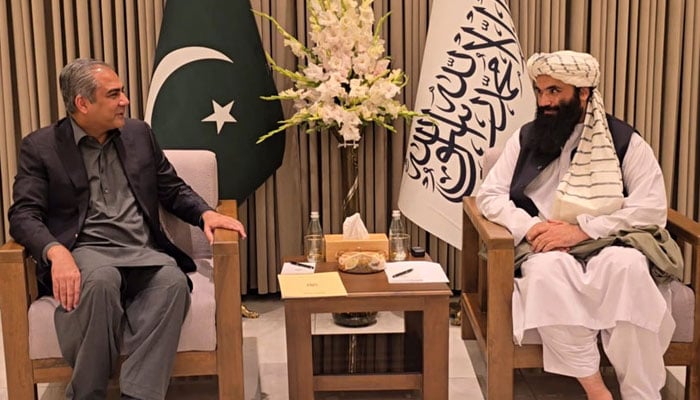Pakistan, Afghanistan vow joint efforts against terrorism, border threats
Naqvi, Haqqani underscore importance of peaceful coexistence, regional stability
July 20, 2025

- Discussion centered on bilateral ties, cross-border infiltration.
- Both leaders explore strategies for efficient border management.
- Naqvi reaffirms commitment to foster relations with Afghanistan.
KABUL: Pakistan and Afghanistan on Sunday agreed to bolster bilateral cooperation to curb terrorism, manage their shared border more effectively, and ensure regional stability.
This understanding was reached during a meeting between Interior Minister Mohsin Naqvi and his Afghan counterpart Sirajuddin Haqqani in Kabul, according to a statement.
Interior Minister Naqvi arrived in Kabul on a day-long official visit to Afghanistan.
Upon his arrival at the Kabul airport today, Naqvi was received by Afghan Interim Deputy Interior Minister Mohammad Nabi Omari. Senior officials from the Afghan Ministry of Interior were also present on the occasion.
During the meeting, the two leaders underscored the importance of peaceful coexistence, regional stability, and enhanced collaboration between both nations.
Discussions centered on bilateral relations, with a particular focus on counterterrorism, cross-border infiltration, and the proscribed Tehreek-e-Taliban Pakistan (TTP).
They also explored strategies for efficient management of the Pakistan-Afghanistan border, curbing drug trafficking, and regulating cross-border movement.
Besides, the repatriation process of Afghan nationals residing illegally in Pakistan was another key topic of discussion.
Speaking on the occasion, Naqvi stressed that terrorist organisations are fueling unrest and instability, and that both countries must work together to eliminate such threats. He reaffirmed Pakistan’s commitment to fostering fraternal and enduring relations with Afghanistan.
He also highlighted Pakistan’s decades-long hospitality towards millions of Afghan refugees, noting that the country’s doors remain open for Afghan citizens arriving through legal channels.
The meeting was also attended by Afghanistan’s Senior Deputy Interior Minister Ibrahim Sardar, Pakistan’s Special Representative for Afghanistan Mohammad Sadiq, Federal Secretary for Interior Khurram Agha, and other high-ranking officials.
The visit comes after both nations took a series of steps to improve ties, such as the upgrading of each country's diplomats from the rank of chargé d’affaires to ambassador.
Pakistan and Afghanistan have embassies in each other's capitals but they are led by charge d'affaires, not ambassadors.
China was the first country to accept an ambassador from the Taliban-run administration in Kabul, though it does not formally recognise its government. Several other states, including the United Arab Emirates (UAE), followed.
The two nations share a porous border spanning around 2,500 kilometres with several crossing points, which hold significance as a key element of regional trade and relations between the people across both sides of the fence.
The issue of terrorism remains a key issue for Pakistan, which has urged Afghanistan to prevent its soil from being used by groups such as the TTP to carry out attacks inside the former’s territory.
Three days earlier, Pakistan signed a trilateral railway agreement with Uzbekistan and Afghanistan in a bid to boost regional connectivity and economic integration.
The Uzbekistan-Afghanistan-Pakistan (UAP) Railway Project aims to build a rail link to connect Uzbekistan with Pakistan via Afghanistan and facilitate access to Pakistani seaports for Central Asian States.
Both countries also held the inaugural round of the Additional Secretary-Level Mechanism talks earlier in the month.











